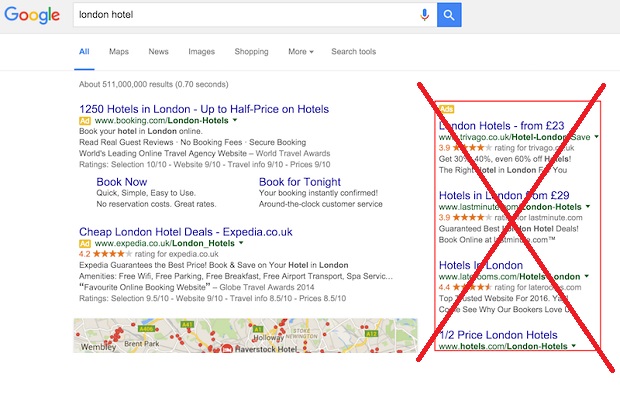Google no longer shows AdWords ads on the right hand side of search results pages. Google now shows four pay-per-click (PPC) ads at the top instead of three for “highly commercial” search terms, or queries where Google believes the user is seeking something to purchase. What does this mean for marketers? And for users?
Search engine experts predict top-of-the-page paid search will become even more competitive and expensive. “Get out your checkbooks and re-check budgets!” declares Kevin Lee at ClickZ.
Meanwhile, with four paid listings at the top, organic listings are pushed further down the search results. Marketers will need to work even harder to create top organic (non-paid) listings.
Less Space for Organic Results
Some marketers lament the decline of prime real estate for organic results. In commercial searchers, all results above “the fold” are ads, notes Christopher Ratcliff at Search Engine Watch. Ratcliff wonders if Internet searchers will eventually get to the point where the entire first search engine results page (SERP) is filled with ads and users instinctively click straight to the second page, in the same way they skip past YouTube pre-rolls.
Most users won’t even notice the extra ad space, since many have trouble distinguishing between paid and organic results, Lee says. Nevertheless, the change does pose major implications for marketers in addition to increasing competition.
Product listing ads (PLAs), which are still allowed on the right side, will become more important. PLAs could become prohibitive for some marketers.
More marketers will upgrade to PPC bid management software to manage bids. Real-time bid management will become more important.
Search engine optimization (SEO), social media and all earned and owned media will become even more important. They stimulate search behavior and raise quality scores if they are done effectively. Some marketers are likely to respond by shifting PPC advertising budgets to SEO, earned media and influencer marketing.
“We could of course panic and bemoan the death of above-the-fold organic SERPs but this may not necessarily be the case. With the rise of ad blockers, whatever anybody is doing with their ads can potentially become irrelevant,” says Julia Logan, SEO consultant at IrishWonder.com.
The change means it’s more important than ever for marketers to do everything possible to make their organic listing stand out. “Ads will evolve, becoming more interactive and visually attractive – this means you should not be left behind,” Logan told Search Engine Watch.
What Google Says
Google says it made the change to improve user experience. Users do not click on right-hand side ads much, indicating they don’t want them, writes Matt Lawson, Google’s director of performance ads marketing, in an article for Search Engine Land. According to Lawson, the data show that small advertisers as a whole haven’t seen much of a change in clicks and the change will not disrupt auction behavior for ads.
“We know that we make changes to the results page quite frequently as search and user behavior evolve, and it can be a lot to keep up with,” Lawson states. “But this change shouldn’t make things hard for you.”
Lawson recommends that marketers:
Monitor their reports. Examine your performance reports segmented by Top vs. Other and compare them to time periods before and after the change. Although the percent of clicks or conversions that you get from those right-rail ads should be small, investigate if you see significant changes.
Watch bids and budgets. Don’t overreact and place bids out of whack with where they should be.
Continue to focus on writing great ads. The recent change to the results page doesn’t affect your ad quality measurements.
Now, however, PPC search ads should be optimized to use the wider top of page format.
Google’s removal of right rail ads may require some adapting of pay per click (PPC) advertising and bidding, especially by smaller companies. Careful attention to the PPC analytics will guide advertisers toward the most effective and cost-efficient strategy – and help determine if other marketing strategies including SEO and PR have become more cost-effective.
Bottom Line: Google’s decision to abandon right-side ads in its search results has significant implications for marketers. As competition for top-of-the-page ads becomes fiercer, high placements for organic listings will become even more important.
William J. Comcowich founded and served as CEO of CyberAlert LLC, the predecessor of Glean.info. He is currently serving as Interim CEO and member of the Board of Directors. Glean.info provides customized media monitoring, media measurement and analytics solutions across all types of traditional and social media.





